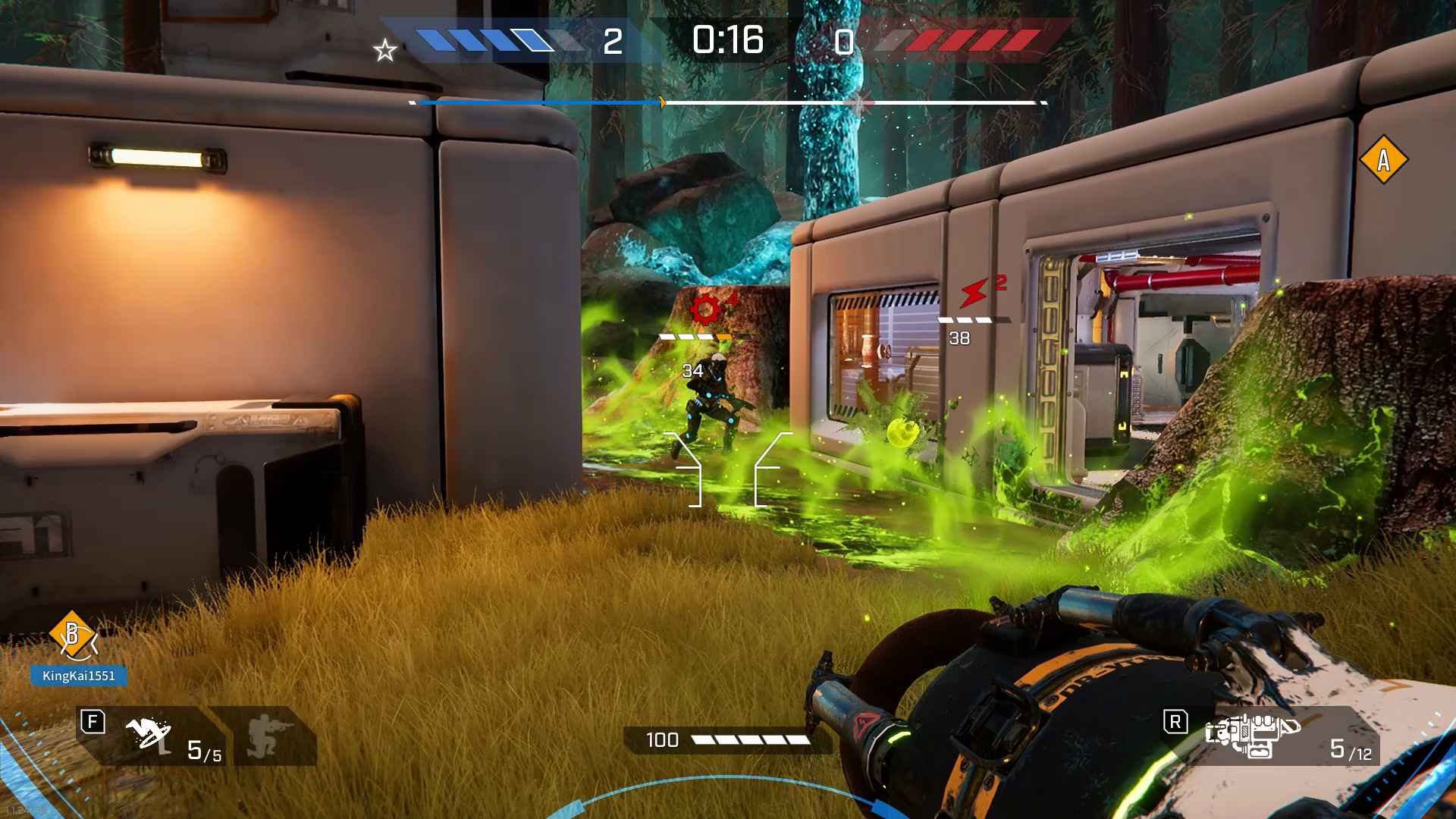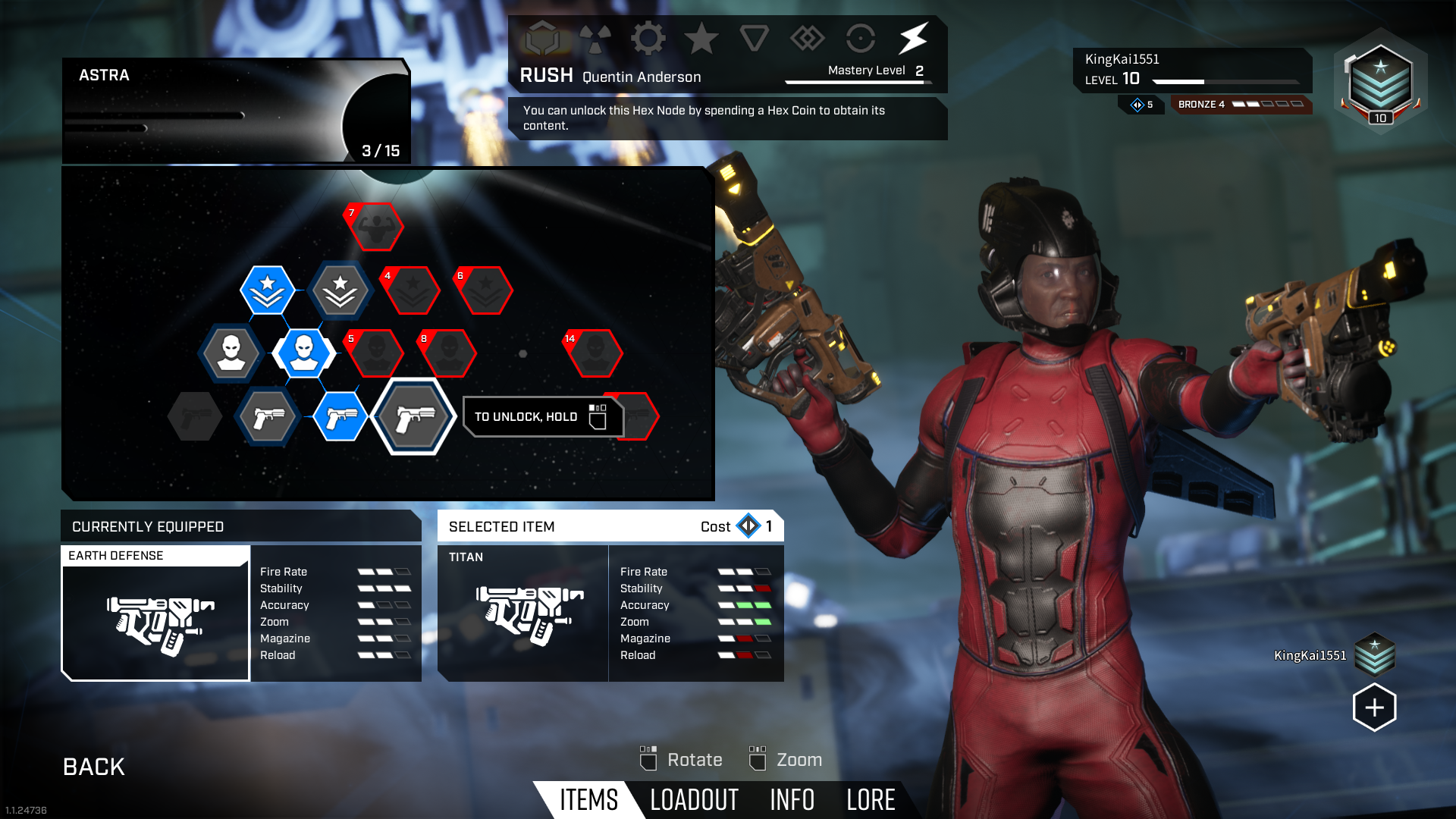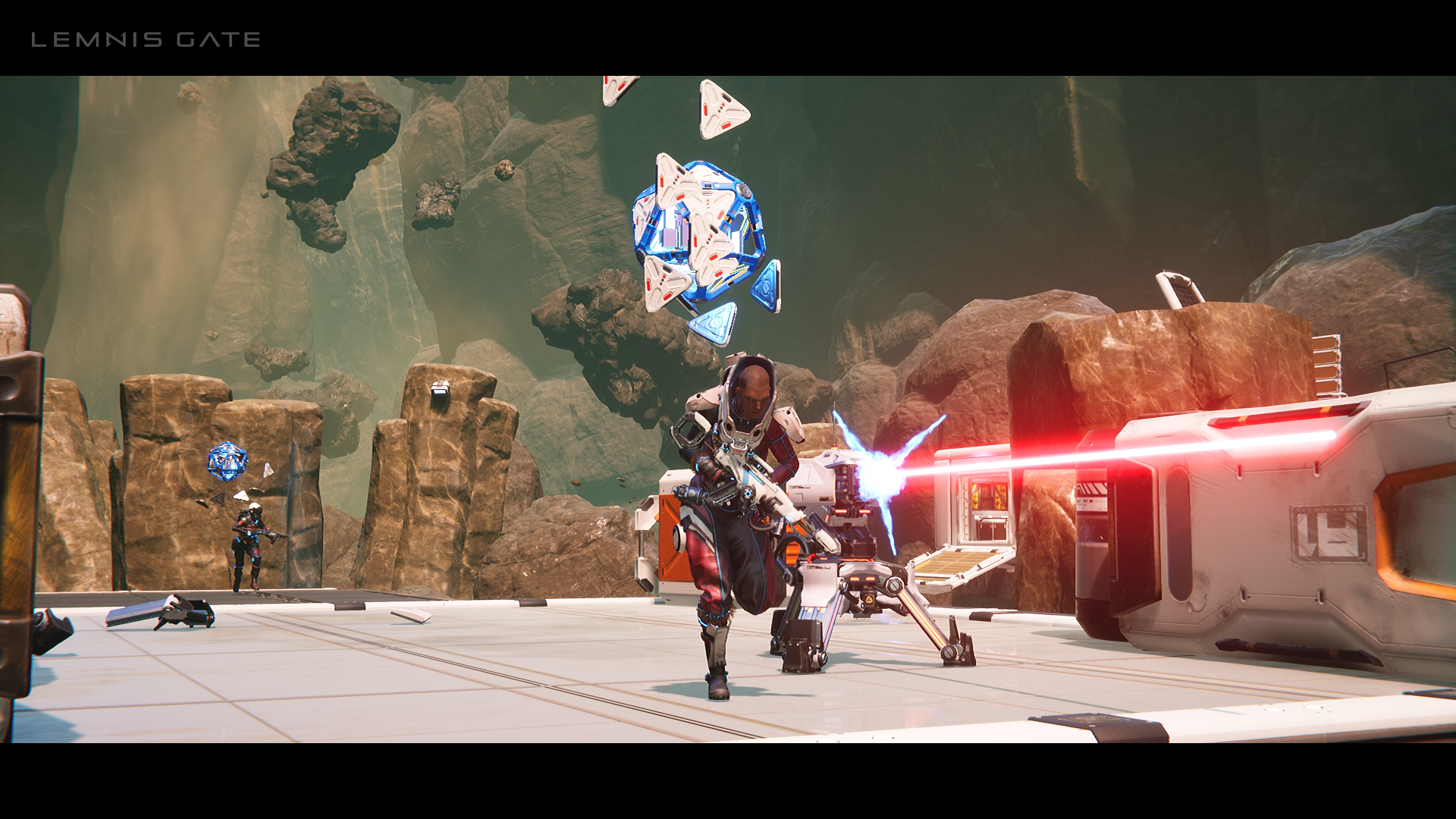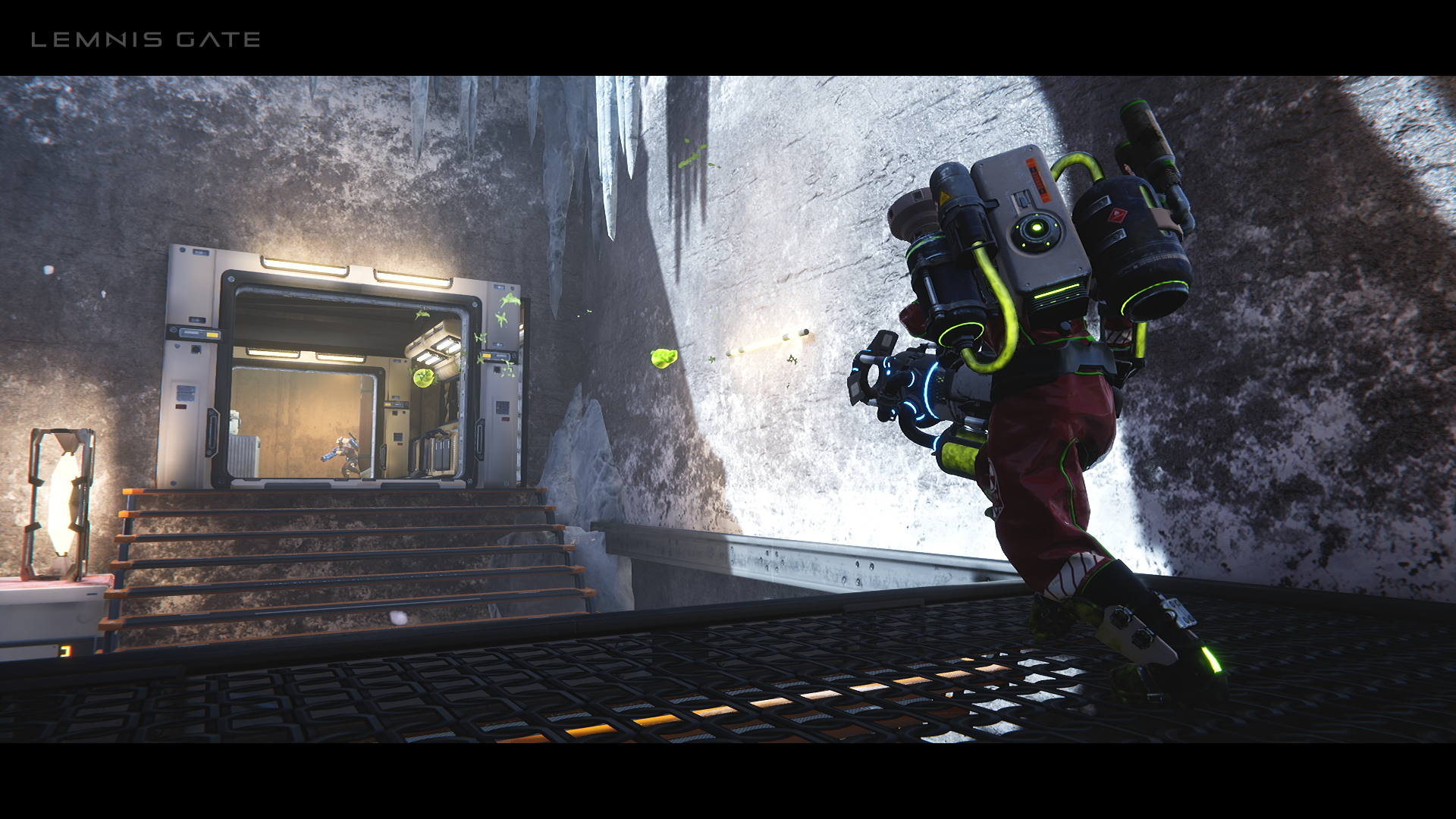Lemnis Gate review | PC Gamer - butlermiltured
Our Verdict
With its well executed timeloop conception, Lemnis Logic gate could be the sleeper shooter of 2021.
PC Gamer Verdict
With its well executed timeloop construct, Lemnis Gate could be the sleeper shooter of 2021.
The recent wave of games organized around timeloop mechanics reveals a bare truth: timefuckery is cool, it makes you feel smart, and videogames, intertwined as they are with the concept of continual death, are the perfect medium to explore it.
Need to know
What is it? Multiplayer FPS with a unique time-loop mechanic
Expect to give: $20/£16 (independent on Xbox Game Pass)
Developer: Ratloop Games Canada
Publisher: Frontier Foundry
Reviewed on: Ryzen 7 5800H, Nvidia GeForce 3070 (mobile), 16GB RAM
Multiplayer? Multiplayer-only
Link: lemnisgategame.com
Lemnis Gate dusts off an old-civilize arena shooter framework and layers it with a bad brilliant time cringle concept. Each match consists of five lap-streak 25-second rounds. For to each one round you pick a unparalleled operative to carry out the mission—which may be a twist around on your classic Deathmatch, Domination, Approach & Defend modes, surgery grabbing orbs from around the map and running play them back to your understructur.
But hither's the temporal twist: with each round—which may be coinciding with your opponent or turn-settled, depending on which match type you queue into—you and your opposing's plays from old rounds get looped in. So by the end of the match you and your enemy are running approximately amidst four ult versions of yourselves, all dutifully stuck on the paths you limit for them.
The key to victory is disrupting the foe's past loopers from carrying unstylish their objectives while conserving yours (this is spiced up in simultaneous modality where you and your enemy move at the homophonic sentence—suppose making simultaneous chess moves with soul!). The most obvious way to disrupt an foeman is to hit them, of course, but things obtain much more newsworthy than that.

Winception
Between rounds and during your opponent's turns, you free-aviate around the map with an observation drone. This isn't some sappy downtime, simply a crucial provision phase. You can use the drone to chase after particularly disruptive enemies, Oregon mark enemy bottlenecks that you can launch a rocket into happening your turn.
As each successive spherical gets busier and more chaotic with the events of previous rounds, Lemnis Gate becomes brain-strainingly tactical. Past the end round you feel like a passkey of the play off, evocative of details like how six seconds into the round an opposition will come running through a certain room access so you can entrust a mine in that location for him in anticipation of his necessary arriver. Of course, during your plays your opponent will also be plotting their path to triumph, and testament definitely see openings that you don't.
Each late polish is a new stick. Answer you, for instance, try to shoot the sniper destined to kill your Tracer bullet-like speedster who throne get to the object lens before anyone else? Or would it be smarter to use of goods and services Karl the robot in the final round to throw a protective shield eruct around your past quick self, block that game-changing bullet from ever reaching its terminus?

Like chess, very much of the satisfaction and strategy is in picking the right piece for the suitable move over. I like to save my Blood feud operative (an engineer, basically) for unpunctual in the match, messing up the board with three or four of her tiny turrets, which auto-lock onto any enemy that passes by.
You won't detect this galaxy-brain stuff and nonsense in Call of Duty.
Lemnis Logic gate's broader arena shooter vibration is reinforced by invulnerable, learnable maps lot on intergalactic colonies, complete with mobility touches like parachute pads and a slippery bunny-skip over maneuver. If the comparable but cartoony Quantum League is the timeloop shooter for the Fortnite generation, then Lemnis Gate is for those who grew up on the space stations and angulate arenas of 1999. The simple weaponset is straight come out of the Unreal Tournament archives, with equivalents like the Link Throttle, the Translocator teleporter, and even the goo-firing Bio Rifle all on hand.
Fourth dimension-road dominoes
Lemnis Logic gate's time-iteration auto-mechanic is soh clever that it makes familiar FPS concepts—like something as ordinary as friendly fire—more interesting. At incomparable point, my opponent got overly aggressive on their turn, and in their dim-sighted play to wipe out my squad killed their own orb-carrying teammate with a misplaced rocket salad shot. Instead of taking this berserker out on my next turn, I let him complete his self-damaging loop spell I ran off to pick up another orb, returning it to base, then nipping back out to pick up the orb helium'd benign vacated for me.

And naturally, you're not on the nose dead when you decease. You keep the round as a shade if you hit 0 H.P., and in this State you tin and should keep carrying out objectives and shot enemies. Should you manage to save that adaptation of yourself from dying in a future round, they (or is it unmoving 'you'?) could swing the fit in your favour. Already players are implementing strategies that affect humorous a duad of their teammates/past selves with a rocket early in the match, completing their rounds as ghosts, then in a later round throwing down an orb so those teammates don't die to the rocket and fail about their loops. IT effectively gives the enemy extra players to deal with that they didn't programme for.
You South Korean won't find this galaxy-brain stuff in Birdsong of Responsibility. IT's all kind-hearted of brilliant: a game where twitch reflexes can embody outdone by careful planning and identifying the enemy's weakspots between rounds. FPS? More like FP-Chess.
On the else hand, a heroic meter display of shot art can untie a solid scheme in a second. During cardinal friction match I was organism exhaustively outsmarted, and exit into the last round my opponent had destroyed both of the reactors I did much a shit-awful job of defending. I sent unsuccessful the goo-hurling Toxin in my attempt to save at least one nuclear reactor and salvage a draw, which I did.
I didn't plan beyond that, but with 10 seconds to go I saw that a timeloop-trapped enemy would cross my line of vision for about incomplete a second on route to my else nuclear reactor. I awaited their range and hurled a ultimate ball. Information technology did honorable sufficiency damage that the turrets in the Reactor board would finish them off, which successively meant my shotgunner defending the reactor would survive, which in reverse meant that the shotgunner would kill the last remaining enemy before they could complete their loop and shoot the reactor.
And thanks to the photograph mode included in the excellent in-game replay system, I can demonstrate that howling game-defining present moment to you:

I hadn't felt such Adam in a comeback since my Rocket salad Conference heyday, and it's testament to the map figure that you lav do an amazing lot in 25 seconds (so time-consuming as you design and execute properly).
Lemnis Gate International Relations and Security Network't perfect, and not just because its name evokes cough syrup to a higher degree 4D Chess with Unreal guns. It doesn't quite have the precision you'd privation from a game where the margins between defeat and victory are and then fine. Acceleration and sprinting feels stodgy, hitboxes around heads and shootable objectives aren't always precise, and the rocket launcher crosshair is a nightmare. Information technology way that amidst all the terrific timeloop stage dancing you (and up to one teammate) devise, there are few moments of hair-tearing frustration when the want of fine-tune undercuts your bullet ballets.
But that speaks to the peaky emotions Lemnis Gate evokes, and these technicalities should get demanding up with time. All altogether it's an auspicious start for this high-concept twist on the arena shooter, where smart strategising between rounds and dexterous gunplay during them are in a constant labor-of-war with each other, where games can hinge connected a single bullet, well-situated turret or—as the case may be—globulet of green goo.
Musician counts could be high (crossplay does help), and you mightiness struggle to discovery a full 2v2 game at this head, but that's altogether the more than conclude to jump on in with a friend. At a modest $20/£16 (or free with Game Pass), it could prove an always-whirling timesink for shooter fans with a cerebral side.
Lemnis Gate
With its well dead timeloop concept, Lemnis Logic gate could be the sleeper shooter of 2021.
Source: https://www.pcgamer.com/lemnis-gate-review/
Posted by: butlermiltured.blogspot.com


0 Response to "Lemnis Gate review | PC Gamer - butlermiltured"
Post a Comment